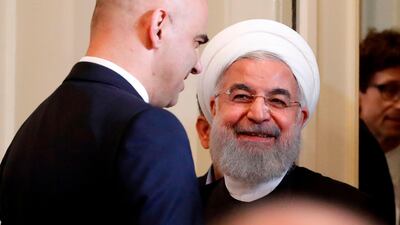Austria is to strip an alleged Iranian spymaster of his diplomatic status after he was arrested in Germany over a suspected plot to bomb a mass meeting of opposition supporters in France.
The diplomat, 46, was held because of his contacts with a married couple intercepted in Belgium with half-a-kilogramme of homemade explosive and a detonator in their car, officials said.
Authorities named the diplomat only as Assadollah A, who was held in Germany on a Europe-wide arrest warrant and is wanted for questioning by Belgian authorities.
Assadollah Assadi - named by dissidents as the arrested man on Monday - is the only person who matches the name on Austrian government records.
Mr Assadi, one of 18 diplomats at Iran’s Vienna embassy, was listed as a low-ranking official but identified by dissidents as station chief of the Ministry of Intelligence and Security (MOIS) in Vienna since 2014.
One of the main responsibilities of the MOIS is to conduct covert operations against the opposition abroad and to “identify and eliminate its members,” according to a 2012 report for US Congress.
“The Iranian diplomat will be denied diplomatic status within 48 hours because of the existence of a European arrest warrant,” Austria's Foreign Ministry said in a statement. The embassy did not respond to requests for comment.
The meeting went ahead on Saturday just north of Paris and attracted thousands of people opposed to clerical rule in Iran. The meeting was addressed by the former New York mayor Rudy Giuliani, Republican grandee Newt Gingrich, and other senior Western officials.
Iran has denied a plot to blow up the meeting of the Paris-based National Council of Resistance of Iran (NCRI) and called the arrests a “false flag ploy” because of its timing just before a visit to Europe of President Hassan Rouhani.
_________________
Read more:
Iran diplomat among six held over plot to bomb opposition group
_________________
The NCRI, an umbrella bloc of opposition groups in exile that seeks an end to clerical rule in Iran, is also known by its Farsi name Mujahideen-e-Khalq (MEK). The MEK was once listed as a terrorist organisation by the United States and the European Union and is seen by Tehran as a criminal network aimed at bringing down the government.
It has been described as cult-like with policies including public confessions of sexual fantasies and enforced divorce for some of its members, former members told the BBC. “One of the reasons why the [regime] haven’t gone all the way to get rid of the MEK is so that they can use them as bogey-figures,” said prominent UK-based activist Potkin Azarmehr.
The group emerged in the 1960s in opposition to the Shah of Iran and rebranded itself in opposition after the 1979 revolution. It has centred around Massoud Rajavi, the leader since 1972 who has not seen for 15 years, and his wife Maryam, the group’s public face, who spoke at the event on Saturday.
The US considers Iran to be the world’s biggest state sponsor of terrorism because of its links with a host of armed groups including Hezbollah and Hamas. Hezbollah has been blamed for a string of attacks on Western targets and operates closely with Iranian intelligence services.
The killings of four Kurdish leaders at the Mykonos restaurant in Berlin, Germany, in 1992, caused a major diplomatic incident after a German court implicated the highest levels of the Iranian regime in the killing.
The furore – and the temporary withdrawal of ambassadors by EU nations from Tehran – had led to a marked downturn in state-sponsored attacks outside of Iran.
“The situation in Iran is very bad and I think the government is trying to murder the Iranian opposition abroad,” one of the survivors of the Mykonos attack, Parviz Dastmalchi, told the National. “They have not learned from 1992 but the reason is because they are in danger.”
In 2012, Iranians were identified by Indian authorities as being behind an assassination plot on an Israeli diplomat that saw a hitman attach a magnetic bomb to an embassy car in New Delhi.
Opposition leaders also blamed Iran over the shooting dead in Istanbul in April last year of the head of a Persian-language media company. The Dubai-based founder of Gem TV, Saeed Karimian, had previously been tried in his absence in a Tehran court and sentenced to six years in prison for spreading propaganda against Iran. Mr Karimian was shot dead when his car was blocked off by another car and two masked men opened fire on his car. His business partner was also killed.


